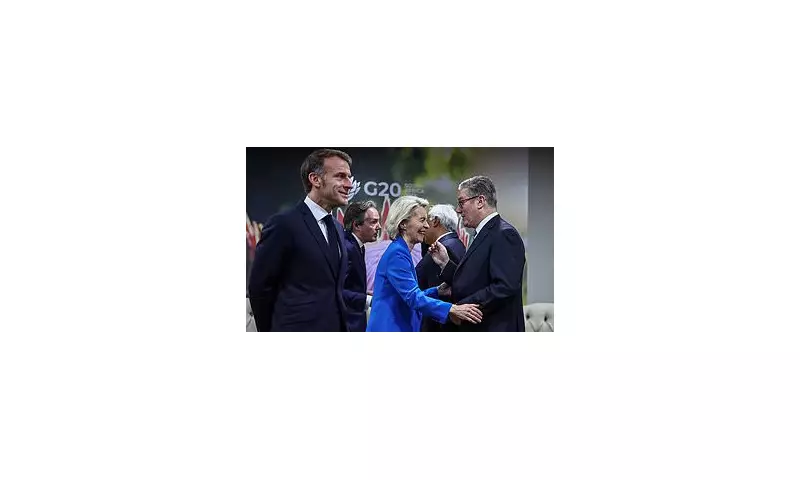
European Commission President Ursula von der Leyen has issued a stark warning that Ukraine's territorial borders cannot be altered through military force, as high-level discussions commenced in Geneva regarding a controversial 28-point peace proposal backed by the United States.
Key Principles for Lasting Peace
The 66-year-old EU leader released a forceful statement during critical negotiations involving top officials from the United States, Ukraine, and national security advisers from Britain, France, and Germany. Von der Leyen emphasised that any agreement with Vladimir Putin's Russia must avoid planting the seeds for future conflicts while prioritising an immediate end to the violence that has persisted for nearly four years.
'Any credible and sustainable peace plan should first and foremost stop the killing and end the war, while not sowing the seeds for a future conflict,' she declared. The European Commission President outlined three fundamental elements necessary for a just and lasting peace that respects Ukrainian sovereignty.
Three Non-Negotiable Elements
First, borders cannot be changed by force - a clear rejection of Russia's attempted territorial acquisitions through military action. Second, she insisted that as a sovereign nation, Ukraine cannot accept limitations on its armed forces that would leave the country vulnerable to future aggression, noting that such restrictions would simultaneously undermine European security. Third, von der Leyen stressed that the European Union's central role in securing peace for Ukraine must be fully recognised, affirming that Ukraine maintains the sovereign right to determine its own European destiny.
Controversial US-Backed Proposal
The peace blueprint under discussion has generated significant controversy, with US Secretary of State Marco Rubio firmly asserting American authorship of the 28-point plan. Rubio pushed back against claims from several senators that the proposal resembled a 'Russian wish list,' though he acknowledged it incorporated input from both Russian and Ukrainian sides.
Former President Donald Trump declared the current proposal was 'by far' not the 'final offer' as Western leaders coordinated responses during frantic G20 summit diplomacy in Johannesburg. The plan, developed by the Trump administration in consultation with the Kremlin, has alarmed European governments by reportedly pushing Ukraine to accept terms that mirror long-standing Moscow demands, including territorial concessions and dramatic reductions in military capacity.
European and other Western leaders cautiously acknowledged in a joint statement on Saturday that the document could potentially serve as a basis for ending the conflict but emphasised that it would require 'additional work' to become acceptable.
International Reactions and Concerns
Prime Minister Keir Starmer, speaking from the G20 summit in South Africa, voiced particular apprehension about proposed caps on Ukraine's military capabilities. 'We are concerned about [caps on military], because it's fundamental that Ukraine has to be able to defend itself if there's a ceasefire,' Starmer stated. He confirmed that senior US personnel, European national security advisers including from Britain, and Ukrainian representatives would continue working on the draft during Sunday talks in Geneva.
French President Emmanuel Macron struck a careful balance, praising Trump's peace efforts while cautioning that any deal must deliver both peace for Ukrainians and 'security for all Europeans.' He noted that 'there are many things that cannot simply be an American proposal, which requires broader consultation.'
German Chancellor Friedrich Merz highlighted the broader European stakes, warning that 'if Ukraine loses this war and possibly collapses, it will have an impact on European politics as a whole, on the entire European continent.' While acknowledging a current opportunity to end the conflict, Merz admitted that 'we are still quite a long way from a good outcome for everyone.'
Military Developments and Diplomatic Timelines
The diplomatic manoeuvring occurred alongside significant military developments, with residents in Moscow experiencing power blackouts and heating disruptions for the first time following a Ukrainian drone strike on the Lenin Shatura thermal plant. Regional governor Andrey Vorobyov admitted a fire broke out at the facility, forcing emergency workers to implement backup power and heating supplies as temperatures dropped below freezing.
Pro-Kremlin media outlets including Readovka confirmed that power and heating disruptions affected residents near the Russian capital - a rare occurrence in the region though commonplace for Ukrainians after constant strikes by Putin's forces. Moscow mayor Sergei Sobyanin acknowledged the capital was under attack by Ukrainian drones, with at least three aircraft shot down.
Meanwhile, Trump has insisted that Kyiv respond to the peace proposal by Thursday, though he hinted that an extension might be possible. Speaking to reporters outside the White House on Saturday, the former president dismissed suggestions the current proposal was final, stating: 'We'd like to get the peace, it should've happened a long time ago. The Ukraine war with Russia should've never happened. If I was president, it would have never happened.'
Ahead of the Geneva gathering, Ukrainian President Volodymyr Zelenskyy issued a video address insisting that his negotiators 'know how to protect Ukrainian national interests and exactly what is needed to prevent Russia from carrying out' another invasion, emphasising that 'real peace is always based on security and justice.'





